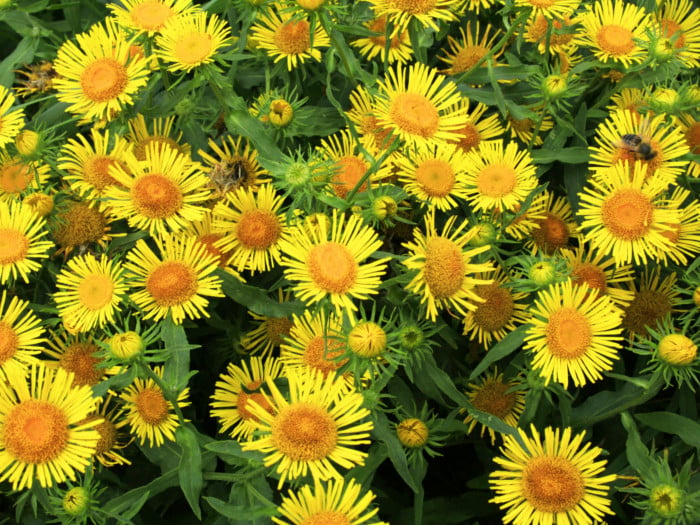Elecampane was beloved by the Celts and revered by the Romans, making this distant cousin of sunflower one of the world’s oldest herbal medicines.
What is Elecampane?
Elecampane (Inula helenium) is a large, woody plant that is a member of the sunflower family. It is commonly known as horse heal or elfdock and is native to Europe and Asia. Historically prescribed as a digestive tonic, it is also famously used to flavor absinthe and vermouth, among various other applications. [1]
Benefits
There are many benefits of elecampane, including the following.
- It is an expectorant and anti-inflammatory able to calm coughs, colds, and asthma. In the 1800s, elecampane was a popular immunostimulatory ingredient in cough drops and cough syrups for this exact reason. [2] [3]
- Elecampane has been used since the days of the ancient Greeks as a tonic to aid digestion, and its antibacterial qualities make it a common treatment for diarrhea and nausea.
- Various parts of this plant are also popularly used as an anthelmintic, killing worms and ridding the system of infestations.
- It has antimicrobial properties and is used to relieve respiratory conditions such as bronchitis. [4]
- This herb is a slight stimulant and is thought to be good for the pelvis and menstruation.
- It has slight diuretic properties and is thought to be specifically helpful for infections of the urinary system.

The pretty elecampane herb has many health benefits. Photo Credit: Shutterstock
Uses
The many uses of elecampane include the following:
- The rhizome or root of elecampane is the part that is most frequently used medicinally.
- The dried root may be eaten by itself, chewed to release the compounds, or administered as a tincture or liquid extract.
- A tea may be made from the root as well, and it is also a popular essential oil.
Side Effects
It can have a few side effects, including the following:
- Pregnancy & breastfeeding: Women should avoid taking this herb during pregnancy or while breastfeeding.
- Allergy: People who have an allergy to the ragweed family may have an adverse cross-reaction.
- Sleepiness: Elecampane causes sleepiness, therefore it is recommended to stop taking it at least two weeks prior to surgery. Furthermore, you should not use these herbal remedies if you are going to operate heavy machinery or drive a car.
